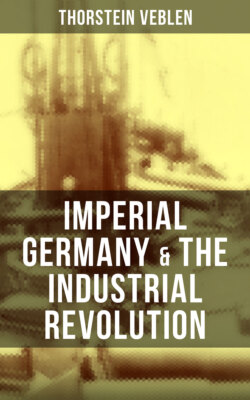Читать книгу Imperial Germany & the Industrial Revolution - Thorstein Veblen - Страница 3
На сайте Литреса книга снята с продажи.
Preface
ОглавлениеTable of Contents
Some apology may seem due on offering at this season so unwarlike a study as what here follows on the case of Imperial Germany and its place in modern civilisation. The essay was projected before the current war came on, though the complexion of subsequent events has also doubtless had its effect on the particular direction taken by the argument at more than one point in the inquiry. The inquiry in hand, therefore, is concerned neither with the controverted merits of the international quarrel nor with the comparative force and probable success of either belligerent. Its aim is the less polemical one of a comparison and correlation between the German case on the one hand and the English-speaking peoples on the other hand, considered as two distinct and somewhat divergent lines of the cultural development in modern times; and the ground on which the inquiry runs is that afforded by the economic, chiefly the industrial, circumstances that have shaped the outcome in either case.
It aims to account for Germany’s industrial advance and high efficiency by natural causes, without drawing on the logic of manifest destiny, Providential nepotism, national genius, and the like. It is believed to be the first attempt yet made at an explanation, as distinct from description or eulogy, of this episode in modern economic history; unless Professor Sombart’s Deutsche Volkswirtschaft im XIX. Jahrhundert may be so regarded. Apart from Professor Sombart’s study of this period, it is believed, nothing of consequence has appeared in the way of a theoretical inquiry into this Imperial era and the run of its industrial affairs, although many scholarly and workmanlike studies have presented the run of the facts from one point of view and another.
There is of course no intention here to impart information on the history of this period, whether political or economic; and the historical information made use of as material for argument is of the commonplace kind familiar by common notoriety or from the standard manuals accessible to all readers. Anything like a comprehensive citation of sources and authorities has accordingly been dispensed with, though citations and references covering given points have been brought in where special occasion appeared to call for it. The argument runs between the lines of the histories, as conventionally written, and does not lean on recondite material or niceties of detail.
To English readers, it is true, the chapter on the Old Order may appear in part to rest on recondite information. The argument bearing on this topic presumes a degree of familiarity with the archćology of the Baltic region, together with a fairly exhaustive first-hand acquaintance with what there is extant of literary remains in the Old Icelandic. It is not a matter in which the reader would be much helped out by a citation of sources; nor would a detailed enumeration of documents and textual passages appear to serve any useful end even in the hands of a specialist in this province of erudition, since the purpose for which this material is here used is such as would be served by nothing short of a somewhat protracted and inclusive familiarity with the entire range of literature in question. The early culture of the Germanic peoples, and of their pre-German forebears, that so comes in sight in these archćological and literary antiquities, is made use of as a term of contrast against which to exhibit the characteristic traits of the modern era, and as showing the cultural point of departure of these peoples, toward which any drift of reversion in their case will necessarily set.
It may also appear that a larger attention has been given to the case of the English-speaking community than would seem warranted by the caption of the title-page. Here, again, the need of a term of comparison has been allowed to decide, as well as the fact that, in the industrial respect, the current German situation is a derivative of the English and an outcome of the past development of the industrial arts as worked out in Great Britain. Some attention has therefore necessarily been given to this past development of industry and its consequences in the British community.
March 1915
